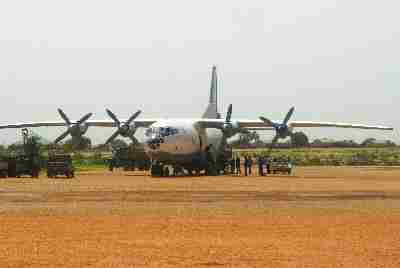Embattled fighters in north Sudan’s flashpoint state of South Kordofan claimed they had shot down two northern army planes, and said the conflict had so far displaced 75,000 people.
UN chief Ban Ki-moon called for an end to the conflict in central Sudan, saying in a statement that he was “alarmed at the deterioration of the security situation and escalation of fighting” in the heavily armed northern state.
“On Friday, our troops shot down two SAF (Sudanese Armed Forces) planes. One was an Antonov bomber in Kalkul and the other was a MiG Joint-3 in Kauda,” said Gamar Delman, a media adviser in the northern branch of the Sudan People’s Liberation Movement (SPLM), the ruling party in the south.
“The air strikes (this week) have caused the displacement of 75,000 civilians. They took place in nine areas of South Kordofan and continued up to yesterday,” he told AFP.
The northern army strongly denied that any of its aircraft had been downed.
“The allegations that SAF planes crashed in South Kordofan are completely wrong,” army spokesman Sawarmi Khaled Saad told reporters in Khartoum.
“The army deeply regrets unbalanced accounts by UNMIS (the United Nations peacekeeping mission in Sudan) of heavy bombardments while it remains silent about the attacks on civilians and their displacement,” he added.
Heavy clashes between the SAF and northern members of the former southern rebel army have raged all week across South Kordofan, the north’s only oil-producing state, with intense fighting in and around state capital Kadugli.
The violence in central Sudan has poisoned the atmosphere of north-south negotiations in Addis Ababa, where the country’s two leaders arrived on Sunday for talks aimed at defusing the crisis and resolving their differences.
The talks are aimed at resolving the crises in the border regions of Abyei and South Kordofan, one month ahead of southern independence.
Sudan President Omar al-Bashir and south Sudan leader Salva Kiir held talks on the key issue of Abyei, focusing on the appointment of a new administration and future security arrangements in the bitterly contested region, Sudan’s official SUNA news agency reported.
“The dialogue continued on Abyei and how to create a new administration and (resolve) the security situation, especially in light of a proposal to deploy Ethiopian forces in the place of UNMIS,” the report said, referring to the UN peacekeeping mission in Sudan.
Malik Agar, head of the northern branch of the SPLM, said the hope was to find a “solution to big problems.”
“We are here for talks to resolve serious issues,” he told AFP from Addis Ababa.
Meanwhile, aid workers say worrying information is starting to emerge of the extent of the fighting and its potential humanitarian impact across the state.
“We are receiving increasingly disturbing reports about ethnically motivated killings, house demolitions and attacks in South Kordofan,” said one international aid official based in Sudan, who has been in contact with several agencies present in the state.
Speaking on condition of anonymity, the official warned that the reason the reported death toll remained low was that the figures were based largely on those supplied by the few hospitals in the state, and because aid agencies and UNMIS cannot yet verify tolls elsewhere.
UN operations have been heavily restricted in and around Kadugli because of the security situation there and the closure of the airport on Friday.
“As the majority of fatalities are probably not taken to hospital, the real death toll is undoubtedly higher — and likely much, much higher,” the aid official said.
In the Nuba Mountains, which cover a large part of South Kordofan and have strong links to the south, tensions are rising along with fears of intensified air strikes.
“The tension is rising each day… There is an eerie calm before the storm, everyone expecting the worst,” said one aid worker in the region.
“Many people are already sleeping in river beds and behind rocks on the hillsides nearby at night — afraid of an aerial attack at any stage,” the aid worker added, also asking not to be identified for security reasons.
Suspected northern supporters of the Sudan People’s Liberation Army (SPLA), the ex-rebel militia turned official southern military, are also reportedly being rounded up.
“This seems to not be only house-to-house searches for SPLA troops but a much broader round-up of anybody whose political affiliations or simply ethnicity makes them a suspect,” the international aid official said.
While the fate of most of those rounded up is not known, the official warned of “several reports of extrajudicial killings” by government-aligned militia.
There have also been reports of the SPLA assassinating a small number of leaders from Khartoum’s ruling National Congress Party in recent days, and of churches and aid agency offices being looted.










